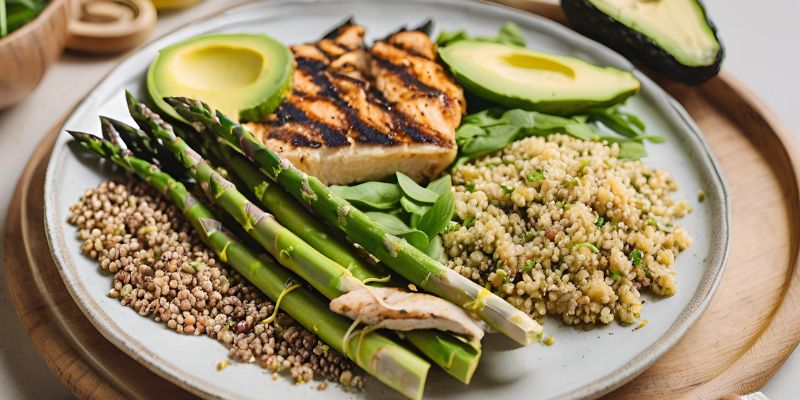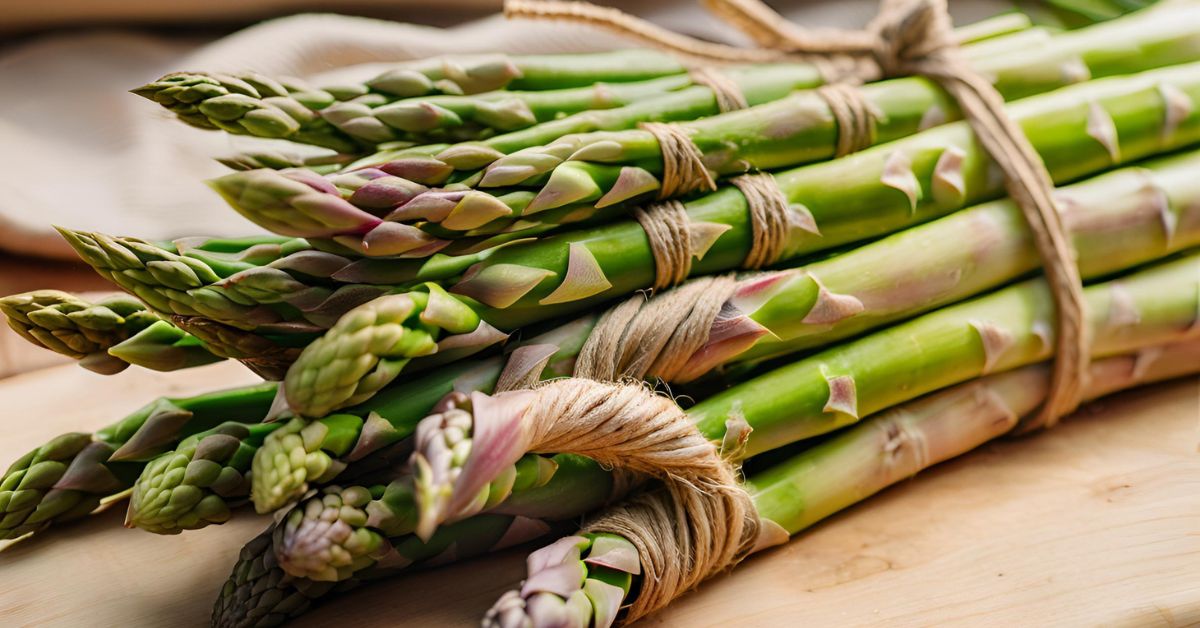Organic asparagus isn’t just a crunchy, delicious side dish—it’s a powerhouse of nutrients your body craves. Did you know that just one cup of asparagus delivers over half your daily recommended intake of vitamin K? That’s essential for strong bones and healthy blood clotting! But the benefits don’t stop there. From gut health to glowing skin, this humble green spear brings a lot to the table.
If you’re looking to eat cleaner, boost your energy, or simply fend off those seasonal colds, organic asparagus could be your new secret weapon. It’s time to go beyond the basics of what’s on your plate and discover why this superfood truly deserves a starring role in your meals. Let’s break down the seven incredible ways it can transform your health—and how you can easily incorporate it into your daily routine!

1. Organic Asparagus Is a Nutrient Powerhouse
When it comes to packing your body with essential nutrients, organic asparagus delivers like few others can.
Rich in Vitamin K for Bone Health
Vitamin K may not get as much spotlight as calcium, but it’s just as important for keeping your bones strong. One cup of organic asparagus provides up to 70% of your daily Vitamin K requirement. This nutrient plays an active role in binding calcium to bone tissue, helping reduce the risk of fractures over time.
Packed with Folate for Cellular Repair
Folate, also known as Vitamin B9, is critical for repairing cells and producing DNA. It’s especially beneficial for pregnant women, as it supports healthy fetal development. For everyone else, it aids in cellular renewal, ensuring your body’s basic building blocks function at full capacity.
Making a small change to include asparagus in your meals can have a huge impact on your daily nutrient intake.
2. How Organic Asparagus Boosts Your Gut Health
Your digestive health deserves just as much attention as your general fitness, and asparagus makes caring for your gut deliciously easy.
A Great Source of Dietary Fiber
Half the solution to digestive issues is fiber, and asparagus is loaded with it. With around 2.8 grams of fiber per cup, this green veggie promotes healthy bowel movements and helps prevent constipation. Plus, it keeps you feeling full longer—great news if you’re watching your calorie intake.
Contains Prebiotics for Friendly Gut Bacteria
Organic asparagus is also a prebiotic powerhouse. It contains inulin, a type of carbohydrate that nourishes beneficial gut bacteria like bifidobacteria and lactobacilli. A balanced gut microbiome doesn’t just help digestion but also strengthens your immune system.
Add asparagus to your diet, and your gut will thank you for it.
3. Protect Your Heart with Organic Asparagus
Cardiovascular diseases remain a leading cause of death worldwide. But the good news? Your diet plays a significant role in prevention, and asparagus can support heart health in multiple ways.
Helps Lower Cholesterol Naturally
The fiber in organic asparagus not only promotes digestion but also helps reduce levels of low-density lipoprotein (LDL), often referred to as “bad cholesterol.” Lower cholesterol levels mean less plaque in your arteries, reducing the risk of heart attacks and strokes.
Rich in Antioxidants That Reduce Heart Disease Risk
Asparagus is full of antioxidants, like glutathione, which fight oxidative stress. Oxidative stress can damage blood vessels and lead to inflammation—major contributors to heart disease. Add this veggie to your plate, and you’ll be giving your heart some much-needed care.

4. Organic Asparagus for Your Fitness Goals
Whether you’re trying to shed a few pounds or maintain a healthy weight, asparagus is a perfect addition to your diet.
Naturally Low in Calories and Fats
One cup of asparagus has only about 20 calories and almost no fat. But don’t be fooled—this low-calorie count doesn’t mean you’ll go hungry. Its combination of fiber and water makes it incredibly filling, helping you avoid unnecessary snacking.
High Water Content for Hydration and Satiety
With over 90% of its weight coming from water, organic asparagus doesn’t just keep you hydrated—it helps you feel full, too. Hydration plays a key role in regulating hunger, and staying hydrated can make weight management much easier.
Next time you’re meal prepping, skip the potato chips and reach for a handful of roasted organic asparagus spears instead.
5. Detox Made Easy with Organic Asparagus
Our bodies are constantly exposed to toxins—whether from pollution, processed foods, or stress. Organic asparagus is a natural detox hero that can help cleanse your system.
Acts as a Natural Diuretic
Organic asparagus contains asparagine, an amino acid that boosts kidney function and acts as a natural diuretic. It helps flush excess salt and toxins out of your body, reducing bloating and promoting better overall function.
Enhances Liver Efficiency
Your liver is your body’s main detox organ, and asparagus can give it a needed boost. Compounds in asparagus, such as saponins, help optimize liver function so it can deal with toxins more efficiently.
Swap out high-sodium snacks for an asparagus-based recipe, and your body will feel lighter and cleaner.
6. Stay Young With the Antioxidants in Organic Asparagus
Aging gracefully doesn’t have to mean shelling out for fancy creams or treatments. Sometimes, it’s about what you eat—and asparagus is a top contender for keeping you youthful inside and out.
Fights Free Radicals That Accelerate Aging
Free radicals are everywhere—from UV rays to polluted air—and they accelerate the onset of wrinkles, fine lines, and other signs of aging. The antioxidants in asparagus, including Vitamin E, Vitamin C, and glutathione, neutralize these harmful molecules.
Reduces Risk of Chronic Diseases
Antioxidants don’t just fight aging—they also help prevent chronic illnesses like diabetes, cancer, and Alzheimer’s. By destroying free radicals before they can do harm, organic asparagus keeps your body in excellent long-term condition.

7. Fortify Your Immune System With Organic Asparagus
No one likes getting sick. Fortunately, adding organic asparagus to your weekly meal plan can bolster your immune system and keep those pesky colds at bay.
Rich in Vitamins A and C
Both Vitamin A and Vitamin C are key to keeping your immune system strong. Vitamin A supports healthy mucous barriers in the nose and throat (your first line of defense), while Vitamin C enhances your body’s ability to fight infections.
Lowers Inflammation in the Body
Inflammation is a common factor in weakened immunity. Asparagus contains anti-inflammatory compounds that keep your immune system functioning smoothly, allowing it to focus on fending off real threats.
Explore how fresh ingredients can elevate your dishes with these Fresh Ingredients: 10 Incredible Flavors that will tantalize your taste buds.
How to Enjoy the Health Benefits of Organic Asparagus
Knowing the benefits is just the first step—you’ve got to make asparagus a kitchen staple to reap the rewards.
Simple and Tasty Recipes to Try
Bored with bland salads? Try roasting asparagus with olive oil and garlic for a crispy, flavorful side dish. Or blend it into a creamy asparagus soup for a comforting meal. You can also toss it into a quinoa salad for an extra boost of nutrients.
Tips for Buying Fresh Organic Asparagus
When shopping, look for firm stalks with tightly-closed tips. The fresher the asparagus, the better the flavor and nutrient profile. Organic varieties ensure you avoid harmful pesticides while getting the most from your produce.
Storing and Preparing for Maximum Nutrition
Once you’ve brought it home, keep asparagus wrapped in a damp towel in your fridge to maintain freshness. And don’t forget to snap off the woody ends before cooking for the best taste and texture.

Final Thought
Organic asparagus is more than just a vegetable—it’s a superfood packed with nutrients and health benefits that make it a must-have in any diet. From supporting your heart and gut to boosting immunity and aiding weight management, this green powerhouse has something for everyone.
Now is the time to take action. Head to your local market, grab some fresh organic asparagus, and start incorporating it into your meals. Your body—and your taste buds—will thank you!
If you’re curious about how other superfoods can boost your health, don’t miss our deep dive into the 8 surprising benefits of fresh chickpeas—you might just find your next pantry staple!
Stay connected with us!
- Follow us on Instagram: @RoastedKitchen25 for daily cooking inspiration.
- Subscribe to our newsletter for exclusive recipes, expert tips, and kitchen hacks straight to your inbox!
FAQ
1. What makes organic asparagus better than regular asparagus?
Organic asparagus is grown without synthetic pesticides, fertilizers, or genetically modified organisms (GMOs). This means fewer harmful chemicals end up on your plate, making it a healthier and safer option. Additionally, organic farming practices are better for the environment, reducing soil degradation and promoting biodiversity.
2. How do I know if organic asparagus is fresh?
Look for firm stalks with tightly-closed, vibrant green tips. Avoid asparagus with wrinkled skin or dried-out ends. Fresh organic asparagus will also have a slight sheen and should feel crisp when you bend it. For the best flavor and nutrients, consume it within a few days of purchase.
3. Can organic asparagus help with weight loss?
Absolutely! Organic asparagus is naturally low in calories, with just about 20 calories per cup. It’s also rich in fiber, which keeps you full longer and promotes healthy digestion. Its high water content further aids hydration and prevents overeating. Incorporating it into meals can support healthy weight management.
4. What’s the best way to cook organic asparagus to retain its nutrients?
Steaming or roasting organic asparagus are two of the best methods for preserving its nutrients. Steaming locks in vitamins and minerals without adding extra fat, while roasting enhances its natural flavor with minimal nutrient loss. To retain even more nutrients, cook it briefly until it’s tender but still crisp.
5. How should I store organic asparagus to keep it fresh?
To keep organic asparagus fresh, wrap the ends of the stalks in a damp paper towel and place them upright in a container in the fridge. Alternatively, you can store the stalks standing in a jar with about an inch of water in the bottom, similar to how you’d store flowers. Use it within 3-5 days for the best flavor and nutritional quality.

Food has been at the heart of my life since childhood. My father, a passionate restaurateur, owned and ran Cave Way, a beloved restaurant in Narayanganj, Bangladesh. For 19 wonderful years, Cave Way delighted customers with its warm atmosphere and mouthwatering dishes. It was more than a restaurant; it was a community landmark. When my father passed away, the restaurant’s doors closed, but its legacy lived on in me. As a businessman and food enthusiast, I’ve always felt a connection to the joy and stories that food brings into our lives. Roasted Kitchen is my way of honoring that legacy, sharing my passion, and connecting with others who love cooking as much as I do.










 Subscribe to our free newsletter for tips, tutorials, and insights!
Subscribe to our free newsletter for tips, tutorials, and insights!